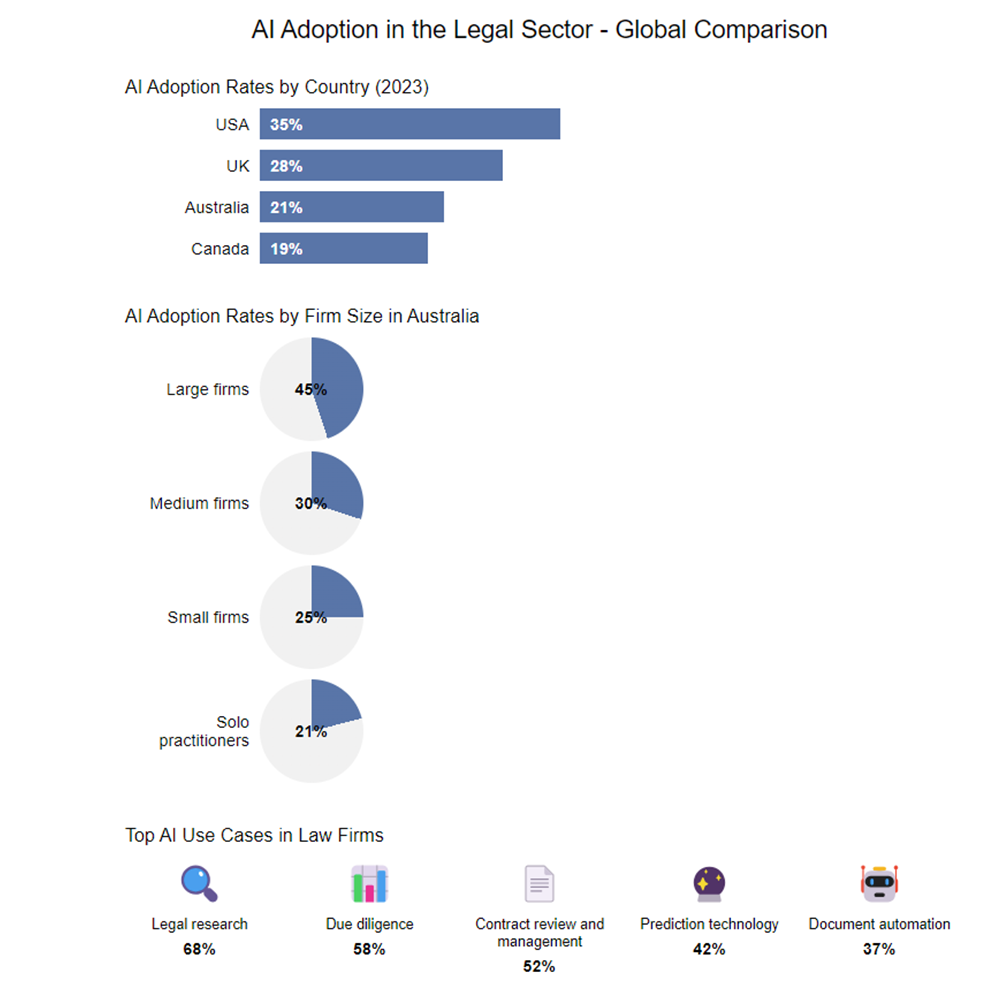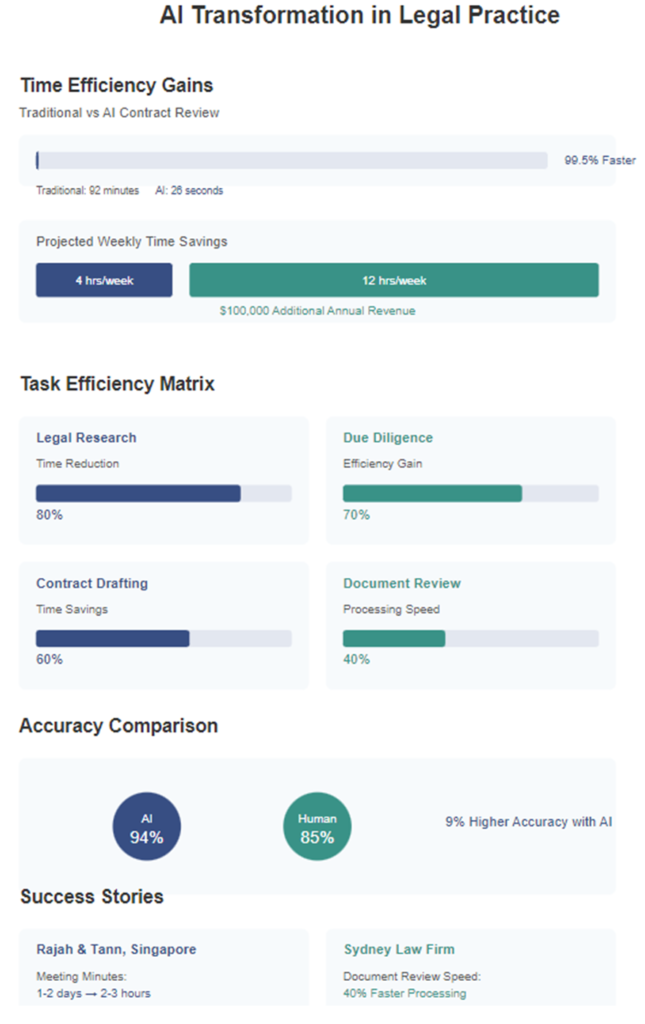By now, you have probably heard of AI Legal Assistants and Agents. But what actually are they? and how can you use them to enhance your legal practice? Well imagine reducing the time you spend drafting documents by up to 50%. Or completely automating client onboarding.
AI legal assistants are not just a possibility—they are a reality reshaping our profession today. From a personal perspective, they are the main AI tool I use with my legal practice today.
Table of Contents:
- Drowning in Paperwork? How AI Legal Assistants Can Be Your Lifeline
- How Do AI Legal Assistants Work?
- Real-World Impact: A Case Study
- Key Benefits of AI Legal Assistants
- AI Chatbots v. AI Legal Assistants: Understanding the Difference
- Transforming Legal Research: How AI Legal Assistants Changing the Game
- Streamlining Document Review: AI Agents at Your Service
- Drafting Made Easy: AI Legal Assistants as Your Co-Author
- AI Legal Assistants and Agents in Case Strategy: Your New Legal Brainstorming Partner
- Ethical Considerations: Navigating the AI Legal Landscape
- Implementing AI Legal Assistants and Agents: A Roadmap for Success
- The Future of Legal Practice: AI Assistants and Human Expertise Combined
- Frequently Asked Questions
Drowning in Paperwork? How AI Legal Assistants Can Be Your Lifeline
Imagine starting your day buried under a mountain of documents. Now imagine if half of that workload disappeared overnight. That’s the power of AI Agents and Assistants. As someone who has navigated the tedious oceans of legal documentation, the relief AI Agents and Assistants brings is not just welcome, it’s revolutionary.

AI legal tools like assistants and agents are designed to alleviate the burden of repetitive tasks, letting lawyers focus on what truly matters—client relationships and complex legal strategies. These tools leverage advanced technologies like natural language processing to automate routine tasks seamlessly and can be tailored to your firm and your firms brand.
How Do AI Legal Assistants Work?
AI legal assistants enhance efficiency by automating tasks such as document drafting and case research. They adapt to your specific needs, learning from each interaction to become more efficient over time.
Real-World Impact: A Case Study

Take, for example, a mid-sized law firm in Sydney that implemented an AI Legal Assistant. They witnessed a 40% reduction in document review time and significantly fewer errors, which improved client satisfaction and retention—a real game changer.
Key Benefits of AI Legal Assistants
• Increased Efficiency: Dramatically reduces time spent on routine tasks.
• Cost Reduction: Decreases the need for additional staff and overhead costs.
• Enhanced Accuracy: Minimizes human error, ensuring precision in document preparation.
• Client Satisfaction: Speeds up response times, enhancing client service.
AI Chatbots v. AI Legal Assistants: Understanding the Difference
AI chatbots handle routine tasks efficiently, while AI Legal Assistants and Agents tackle complex legal tasks that require understanding the law, such as analyzing legal precedents and strategizing on legal issues. This distinction is crucial as it influences the choice between the two based on your firm’s needs.

Transforming Legal Research: How AI Legal Assistants Changing the Game
Tired of exhaustive legal research? AI-powered Assistants and Agents can now deliver comprehensive research results in minutes, a stark contrast to the hours I spent as a junior associate sifting through physical case files.
Streamlining Document Review: AI Agents at Your Service
Consider the traditional challenges of document review, which can be daunting and error-prone. AI document review agents can scrutinize thousands of pages swiftly and with greater accuracy, transforming this arduous task into a streamlined process.
Drafting Made Easy: AI Legal Assistants as Your Co-Author
AI is revolutionizing legal drafting by automating the creation of first drafts based on specific inputs, reducing drafting time by up to 50% and minimizing errors.
Think* a 4-5 year PAE experienced associate junior who can generate a draft in minutes not weeks.
AI Legal Assistants and Agents in Case Strategy: Your New Legal Brainstorming Partner
Integrating AI Assistants and Agents in case strategy can leverage vast data to identify winning strategies, enhancing the analytical capabilities of law firms significantly.
Ethical Considerations: Navigating the AI Legal Landscape
As we embrace AI, we must also consider the ethical implications, including maintaining transparency, ensuring data privacy, and addressing biases, to uphold the integrity of our profession.
Implementing AI Legal Assistants and Agents: A Roadmap for Success
Adopting AI Assistants and Agents involves understanding your firm’s needs, selecting the right tools, and integrating them into your practice, ensuring they complement existing workflows and enhance efficiency.

The Future of Legal Practice: AI Assistants and Human Expertise Combined
Looking ahead, AI Assistants and Agents will increasingly act not only as a tool for efficiency but also as a partner in legal analysis, enriching the strategic, empathetic, and creative aspects of legal counsel.
Frequently Asked Questions
1. What exactly can an AI legal assistant do for my law firm? AI legal assistants can dramatically reduce the time you spend on administrative tasks like document drafting and case research. Think of them as your tireless, caffeine-free interns who don’t need sleep and won’t raid the office biscuit stash!
2. How do AI legal agents differ from AI legal assistants? While both are designed to make your life easier, AI legal agents tackle the more complex tasks that require a deeper understanding of the law, such as analyzing legal precedents and developing legal strategies. It’s like having a junior lawyer on your team who’s available 24/7—minus the need for supervision.
3. Will AI tools replace the lawyers in our firm? Absolutely not! AI tools are here to complement your expertise, not replace it. They handle the grunt work, leaving you more time to focus on high-value tasks like client interaction and strategic decision-making. Think of AI as a super-efficient colleague, not a replacement.
4. What are the risks of integrating AI into our legal practice? While AI offers numerous benefits, there are risks, particularly concerning data privacy and security. It’s important to choose AI solutions that comply with legal standards and to understand how these tools manage and protect sensitive information.
5. How can AI assist in improving client satisfaction? AI can speed up processes like document reviews and legal research, allowing you to respond to clients faster and with more accurate information. This can lead to improved client satisfaction as they receive timely and effective service. Plus, you’ll have more time to actually listen to their anecdotes about their cat!
6. What about the learning curve associated with AI tools? It’s true that adopting new technology involves a learning curve, but many AI tools are designed with user-friendliness in mind. Providers often offer training and support, and there are numerous workshops and webinars available specifically tailored to legal professionals.
7. Can AI tools help with compliance and risk management? Yes, AI tools can be configured to help monitor compliance with legal regulations and standards. They can automate the tracking of changes in legislation and ensure you are always on top of new requirements—kind of like having a watchdog that’s always tuned into the legal channel.
8. How cost-effective are AI legal assistants? Initially, there might be an investment, but the efficiency and accuracy improvements can lead to significant cost savings in the long run. They can reduce the need for additional staff and decrease the hours spent on routine tasks, allowing your firm to allocate resources more strategically.
9. What should we consider when choosing an AI tool for our law firm? Consider tools that integrate well with your existing systems and offer reliable support. Also, evaluate how well these tools meet your specific needs—whether it’s streamlining administrative tasks, enhancing document management, or boosting legal research capabilities.
10. How can AI impact our billing and invoicing processes? AI can automate time tracking and billing, ensuring that no billable hour goes unrecorded. It can also streamline the invoicing process, making it quicker and reducing errors. Imagine sending out invoices that don’t need a follow-up call to explain discrepancies—that’s the dream, right?








